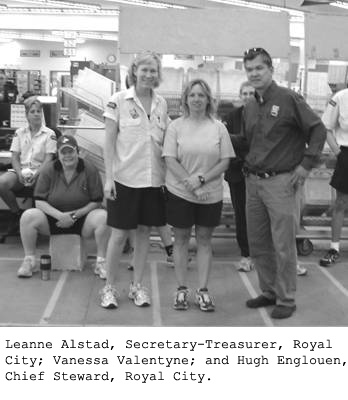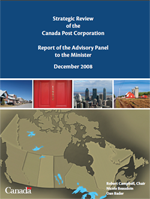New Westminster Letter Carrier Returns to Work after Unjust discharge
A New Westminster Letter Carrier has returned to work over one year after being unjustly discharged.
 On June 23, 2008, Vanessa Valentyne was discharged by Canada Post on the grounds that she was negligent in delaying the delivery of two partial sets of flyers, an error for which she took full responsibility and offered an apology. Despite her ten years of service and clean personal file, Kevin Sullivan, Southern Zone Manager, decided to ignore progressive discipline and proceeded directly with discharge.
On June 23, 2008, Vanessa Valentyne was discharged by Canada Post on the grounds that she was negligent in delaying the delivery of two partial sets of flyers, an error for which she took full responsibility and offered an apology. Despite her ten years of service and clean personal file, Kevin Sullivan, Southern Zone Manager, decided to ignore progressive discipline and proceeded directly with discharge.
At Canada Post, the distinction between an honest mistake and “major misconduct” is often completely arbitrary, largely dependent on the attitude of the management representatives involved. In this case, Canada Post chose to pursue a petty, vindictive discharge instead of exercising common sense.
This arbitration hearing was twice delayed because of Canada Post’s requests for adjournments. The Corporation attempted to obtain a third adjournment by claiming that Kevin Sullivan was “not available” to attend the June 10, 2009 arbitration hearing. In reality, Sullivan was at home serving a five day suspension, himself the beneficiary of progressive discipline. Despite the Corporation’s attempt to further delay the proceedings, Sullivan was compelled to attend the hearing after a process server was dispatched to his residence.
At the commencement of the hearing, Canada Post attempted to alter its allegations. The lawyer appointed to represent Canada Post pulled out the fraud brush and went to great lengths to convince the arbitrator that the Grievor was a liar and had deliberately delayed the delivery of mail. With Kevin Sullivan at his side, Canada Post’s lawyer also argued that the Grievor was dishonest and held contempt for her job.
In assessing the evidence, Arbitrator Joan Gordon rejected each of Canada Post’s claims:
The evidence does not support a finding of dishonesty, deceit and/or surreptitiousness by the Grievor.
In the result, Arbitrator Gordon reduced the penalty of discharge to a five (5) day suspension. The Grievor is now entitled to lost wages and benefits for a period of approximately one year.
 In her June 25, 2009 presentation to employees at the Vancouver Mail Processing Plant, Canada Post CEO Moya Greene (the architect of our current labour relations climate) made condescending reference to our “petty grievance procedure”. Notwithstanding those comments, the importance of our “petty grievance procedure” is underscored by the skyrocketing discharge rate in the Pacific Region. Since January 1, 2009 the discharge rate is on track to increase by 263%!
In her June 25, 2009 presentation to employees at the Vancouver Mail Processing Plant, Canada Post CEO Moya Greene (the architect of our current labour relations climate) made condescending reference to our “petty grievance procedure”. Notwithstanding those comments, the importance of our “petty grievance procedure” is underscored by the skyrocketing discharge rate in the Pacific Region. Since January 1, 2009 the discharge rate is on track to increase by 263%!
It is the “petty grievance procedure” that protects employees from frivolous, petty, unjust discharges.
Welcome back, Vanessa!
In solidarity,
Ken Mooney
Regional Grievance Officer






 meeting, RDC employees were told that they could not start working until
meeting, RDC employees were told that they could not start working until  In a controlled environment,
In a controlled environment,  In a true forum,
In a true forum, 


 Section 74 (1) of the Election Act states that an employee who is entitled to vote in an election or who, on registration, will be entitled to vote in the election is entitled to have 4 consecutive hours free from employment during voting hours for general voting. Section 74 (2) of the Election Act states that if an individual’s hours of employment do not allow for the consecutive hours referred to in subsection (1), the individual’s employer must allow the individual time off from employment to provide those hours. Section 74 (4) an employer must not (a) without reasonable justification, fail to grant to an employee sufficient time off as required by subsection (2), or (b) make a deduction in pay for the time off or exact any penalty from the employee for the time off.
Section 74 (1) of the Election Act states that an employee who is entitled to vote in an election or who, on registration, will be entitled to vote in the election is entitled to have 4 consecutive hours free from employment during voting hours for general voting. Section 74 (2) of the Election Act states that if an individual’s hours of employment do not allow for the consecutive hours referred to in subsection (1), the individual’s employer must allow the individual time off from employment to provide those hours. Section 74 (4) an employer must not (a) without reasonable justification, fail to grant to an employee sufficient time off as required by subsection (2), or (b) make a deduction in pay for the time off or exact any penalty from the employee for the time off. 
